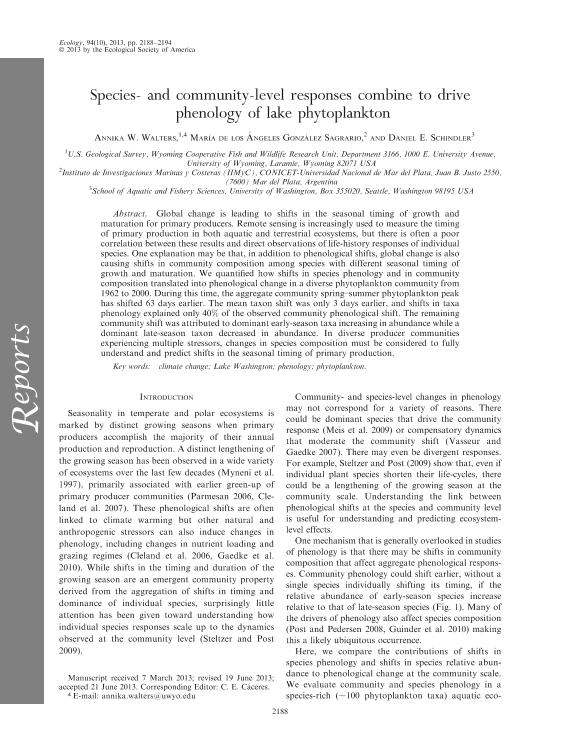Artículo
Species- and community-level responses combine to drive phenology of lake phytoplankton
Fecha de publicación:
10/2013
Editorial:
Ecological Society of America
Revista:
Ecology
ISSN:
0012-9658
Idioma:
Inglés
Tipo de recurso:
Artículo publicado
Clasificación temática:
Resumen
Global change is leading to shifts in the seasonal timing of growth and maturation for primary producers. Remote sensing is increasingly used to measure the timing of primary production in both aquatic and terrestrial ecosystems, but there is often a poor correlation between these results and direct observations of life-history responses of individual species. One explanation may be that, in addition to phenological shifts, global change is also causing shifts in community composition among species with different seasonal timing of growth and maturation. We quantified how shifts in species phenology and in community composition translated into phenological change in a diverse phytoplankton community from 1962 to 2000. During this time, the aggregate community spring–summer phytoplankton peak has shifted 63 days earlier. The mean taxon shift was only 3 days earlier, and shifts in taxa phenology explained only 40% of the observed community phenological shift. The remaining community shift was attributed to dominant early-season taxa increasing in abundance while a dominant late-season taxon decreased in abundance. In diverse producer communities experiencing multiple stressors, changes in species composition must be considered to fully understand and predict shifts in the seasonal timing of primary production.
Palabras clave:
Climate Change
,
Lake Washington
,
Phenology
,
Phytoplankton
Archivos asociados
Licencia
Identificadores
Colecciones
Articulos(IIMYC)
Articulos de INSTITUTO DE INVESTIGACIONES MARINAS Y COSTERAS
Articulos de INSTITUTO DE INVESTIGACIONES MARINAS Y COSTERAS
Citación
Walters, Annika W.; Gonzalez Sagrario, Maria de Los Angeles; Schindler, Daniel E.; Species- and community-level responses combine to drive phenology of lake phytoplankton; Ecological Society of America; Ecology; 94; 10; 10-2013; 2188-2194
Compartir
Altmétricas




